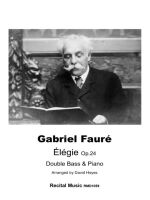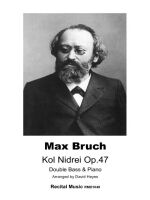Édouard Nanny Transcription Series

Product code:
£10.00
Description
Édouard Nanny (1872-1942) was the leading French bassist of his generation and is recognised as the founder of the modern French double bass school. 2022 is the 150th anniversary of his birth and Recital Music is marking this significant anniversary with a series of exciting new editions.
Édouard Nanny Transcription Series brings together three evocative and accessible recital pieces for double bass and piano – two transcriptions and one original work by Nanny, but published under a pseudonym and in the 18th-century style. Ideal for the intermediate bassist who enjoys playing throughout the solo register of the double bass.
This edition includes piano accompaniments for both solo and orchestral tunings.
Antonio Francesco Tenaglia – Aria
Tenaglia’s Aria has been arranged for many instruments and instrumental combinations, and is lyrical and dramatic making effective use of the solo register of the double bass. Its minor/major tonalities create a musical tension and interest and there are numerous musical and technical challenges for the intermediate bassist and demonstrates the lyrical, cantabile and sonorous qualities of the double bass.
The outer sections are from the Aria Begli occhi, merce and the score states the middle section was composed by Franz Ries (1846-1932), who also made an edition for violin or cello solo and piano. This aria was first published in a collection of old Italian music by The Cecilia Society in Copenhagen in about 1855 and in an English translation, Take pity, sweet eyes by Mary A. Robinson in 1881-2.
Italian composer, keyboard player and lutenist, Antonio Francesco Tenaglia was born in Florence c.1615-1620 and died in Rome after 1661. He spent much of his career in Rome and was a leading composer of solo cantatas, and over 60 have survived. He also composed a number of operas and madrigals, some published during his lifetime.
Jean-Paul-Égide Martini – Plaisir d’Amour
First published in 1929, this beautiful and tasteful transcription by Édouard Nanny has long been out of print. It was recorded by František Pošta, Principal Bass of the Czech Philharmonic Orchestra for over 40 years, and is now available with the accompaniment for both solo and orchestral tunings for the first time.
Giovanni Battista Martini (1706-1784) was the name of the composer in the first edition in 1929, but Plaisir d’Amour was actually composed by Jean-Paul-Égide Martini (1741-1816) in 1784. The song was greatly successful during the composer’s lifetime and it was also arranged by Hector Berlioz for voice and orchestra, and subsequently for many instruments. Plaisir d’Amour has been performed by a vast array of singers over the years from Elisabeth Schwarzkopf and Placido Domingo in the operatic field to popular singers such as Joan Baez, Marianne Faithfull, Nana Mouskouri and Emmylou Harris.
Lorenziti – Gavotte
Lorenziti’s Gavotte is a lively and enjoyable work aimed at the intermediate bassist and utilises much of the range of the double bass, including high harmonics. It is a useful introduction to the upper reaches of the instrument and is fun to study and perform, also ideal for any audience or occasion. The accompaniment is simple and supportive and this ‘old classic’ was popularised by the American virtuoso Gary Karr in his Children’s Concerts.
Who was Lorenziti? David Heyes believes that the Gavotte was written by Édouard Nanny but in the style of a previous age and more information is available at https://bassmagazine.online/en/finding-lorenziti/
This edition also includes a double bass part for the less experienced bassist which only includes music in bass clef and harmonics.
Édouard Nanny (1872-1942) was the leading French bassist of his generation, taught at the Paris Conservatoire for 20 years, and is recognised as the founder of the modern French double bass school.
Alongside a wealth of transcriptions for double bass, Nanny also composed a series of original works which are worthy of revival in the 21st-century. His music is elegant and charming, exploiting the lyrical and technical possibilities of the double bass, and all are useful as both study and concert repertoire for the progressing and advanced bassist.
An anniversary is a good time to reassess a composer’s work and Recital Music will create new editions of a number of Nanny’s original works and transcriptions this year.
Édouard Nanny is an important figure in the development of the double bass during the first four decades of the 20th-century, particularly in France, and much of his educational music is still in print today. He made an amazing contribution to the double bass world and deserves to be celebrated and remembered.
Description
Édouard Nanny (1872-1942) was the leading French bassist of his generation and is recognised as the founder of the modern French double bass school. 2022 is the 150th anniversary of his birth and Recital Music is marking this significant anniversary with a series of exciting new editions.
Édouard Nanny Transcription Series brings together three evocative and accessible recital pieces for double bass and piano – two transcriptions and one original work by Nanny, but published under a pseudonym and in the 18th-century style. Ideal for the intermediate bassist who enjoys playing throughout the solo register of the double bass.
This edition includes piano accompaniments for both solo and orchestral tunings.
Antonio Francesco Tenaglia – Aria
Tenaglia’s Aria has been arranged for many instruments and instrumental combinations, and is lyrical and dramatic making effective use of the solo register of the double bass. Its minor/major tonalities create a musical tension and interest and there are numerous musical and technical challenges for the intermediate bassist and demonstrates the lyrical, cantabile and sonorous qualities of the double bass.
The outer sections are from the Aria Begli occhi, merce and the score states the middle section was composed by Franz Ries (1846-1932), who also made an edition for violin or cello solo and piano. This aria was first published in a collection of old Italian music by The Cecilia Society in Copenhagen in about 1855 and in an English translation, Take pity, sweet eyes by Mary A. Robinson in 1881-2.
Italian composer, keyboard player and lutenist, Antonio Francesco Tenaglia was born in Florence c.1615-1620 and died in Rome after 1661. He spent much of his career in Rome and was a leading composer of solo cantatas, and over 60 have survived. He also composed a number of operas and madrigals, some published during his lifetime.
Jean-Paul-Égide Martini – Plaisir d’Amour
First published in 1929, this beautiful and tasteful transcription by Édouard Nanny has long been out of print. It was recorded by František Pošta, Principal Bass of the Czech Philharmonic Orchestra for over 40 years, and is now available with the accompaniment for both solo and orchestral tunings for the first time.
Giovanni Battista Martini (1706-1784) was the name of the composer in the first edition in 1929, but Plaisir d’Amour was actually composed by Jean-Paul-Égide Martini (1741-1816) in 1784. The song was greatly successful during the composer’s lifetime and it was also arranged by Hector Berlioz for voice and orchestra, and subsequently for many instruments. Plaisir d’Amour has been performed by a vast array of singers over the years from Elisabeth Schwarzkopf and Placido Domingo in the operatic field to popular singers such as Joan Baez, Marianne Faithfull, Nana Mouskouri and Emmylou Harris.
Lorenziti – Gavotte
Lorenziti’s Gavotte is a lively and enjoyable work aimed at the intermediate bassist and utilises much of the range of the double bass, including high harmonics. It is a useful introduction to the upper reaches of the instrument and is fun to study and perform, also ideal for any audience or occasion. The accompaniment is simple and supportive and this ‘old classic’ was popularised by the American virtuoso Gary Karr in his Children’s Concerts.
Who was Lorenziti? David Heyes believes that the Gavotte was written by Édouard Nanny but in the style of a previous age and more information is available at https://bassmagazine.online/en/finding-lorenziti/
This edition also includes a double bass part for the less experienced bassist which only includes music in bass clef and harmonics.
Édouard Nanny (1872-1942) was the leading French bassist of his generation, taught at the Paris Conservatoire for 20 years, and is recognised as the founder of the modern French double bass school.
Alongside a wealth of transcriptions for double bass, Nanny also composed a series of original works which are worthy of revival in the 21st-century. His music is elegant and charming, exploiting the lyrical and technical possibilities of the double bass, and all are useful as both study and concert repertoire for the progressing and advanced bassist.
An anniversary is a good time to reassess a composer’s work and Recital Music will create new editions of a number of Nanny’s original works and transcriptions this year.
Édouard Nanny is an important figure in the development of the double bass during the first four decades of the 20th-century, particularly in France, and much of his educational music is still in print today. He made an amazing contribution to the double bass world and deserves to be celebrated and remembered.



